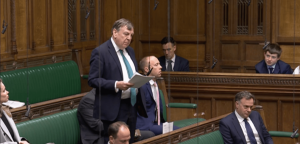Many of my constituents have written to me this week, to tell me their views on last weeks sewage discharge vote, particularly with regards to the environmental impact of poor storm overflow systems. I too, completely agree that the amount of sewage being released into our rivers and seas is unacceptable and must be addressed as a priority.
Storm overflows are used during extreme weather to prevent pipes from becoming overloaded. These relief mechanisms protect our homes and businesses and without them, properties would likely be flooded by water and backed up sewage during periods of heavy rainfall. Climate change has led to increased rainfall, while water infrastructure has not kept pace with development growth. That is why the Environment Bill has been amended to help crack down on pollution in our rivers, waterways, and coastlines and to better tackle the harm that these overflows cause.
Despite what you may have read, it is categorically not the case that I voted to allow water companies to pollute our rivers at will. However, the consequences of the amendment, while well intentioned, would have been vast. Initial assessments suggest that total elimination of discharges from storm overflows would cost anywhere between £150 billion and £650 billion. This process could involve the complete separation of sewerage systems, leading to potentially significant disruption for homes, businesses and infrastructure across the country. It could bankrupt our water companies, and cost UK taxpayers anywhere between £5000 and £20,000 per household, something that I could not support. The vast majority of my constituents, even if they support improved environmental standards, simply could not afford this.
Instead, I voted to strengthen the Environment Bill so that it places a new duty directly on water companies to progressively reduce the adverse impacts of storm overflow discharges.
It is already the case that water companies are investing £3.1 billion over the next 5 years on storm overflow improvements. Measures to improve storm overflow systems are informed by the work of the Storm Overflows Task Force, which Defra established in August 2020 to bring together key stakeholders from the water industry, environmental NGOs, regulators, and Government to drive progress in reducing sewage discharges. The Taskforce, and the government are both committed to the long-term goal of eliminating harm from storm overflows.
The new Environment Bill will create:
- a new duty directly on water companies to produce comprehensive statutory Drainage and Sewerage Management Plans, setting out how they will manage and develop their drainage and sewerage system over a minimum 25-year planning horizon, including how storm overflows will be addressed through these plans.
- a power of direction for the government to direct water companies in relation to the actions in these Drainage and Sewerage Management Plans. We will not hesitate to use this power of direction if plans are not good enough.
- a new duty on Government to produce a statutory plan to reduce discharges from storm overflows
- a requirement for government to produce a report setting out the actions that would be needed to eliminate discharges from storm overflows in England, and the costs and benefits of those actions. Both publications are required before 1 September 2022.
- a new duty directly on water companies and the Environment Agency to publish data on storm overflow operation on an annual basis.
- a new duty directly on water companies to publish near real time information on the operation of storm overflows.
- a new duty directly on water companies to monitor the water quality upstream and downstream of storm overflows and sewage disposal works.
In addition, in July of this year, this Government set out, for the first time ever, its expectation that Ofwat should incentivise water companies to invest to significantly reduce the use of storm overflows in the forthcoming pricing review period. Ofwat will be required to act in accordance with this expectation.
Let me be clear, I want sewage discharge to stop. I believe that the measures in the Bill will lead to the best way of achieving this at an affordable cost.


